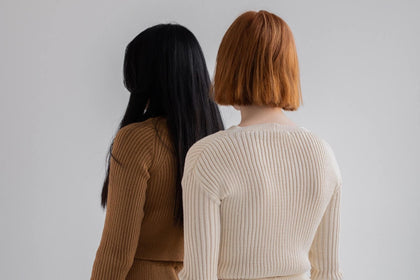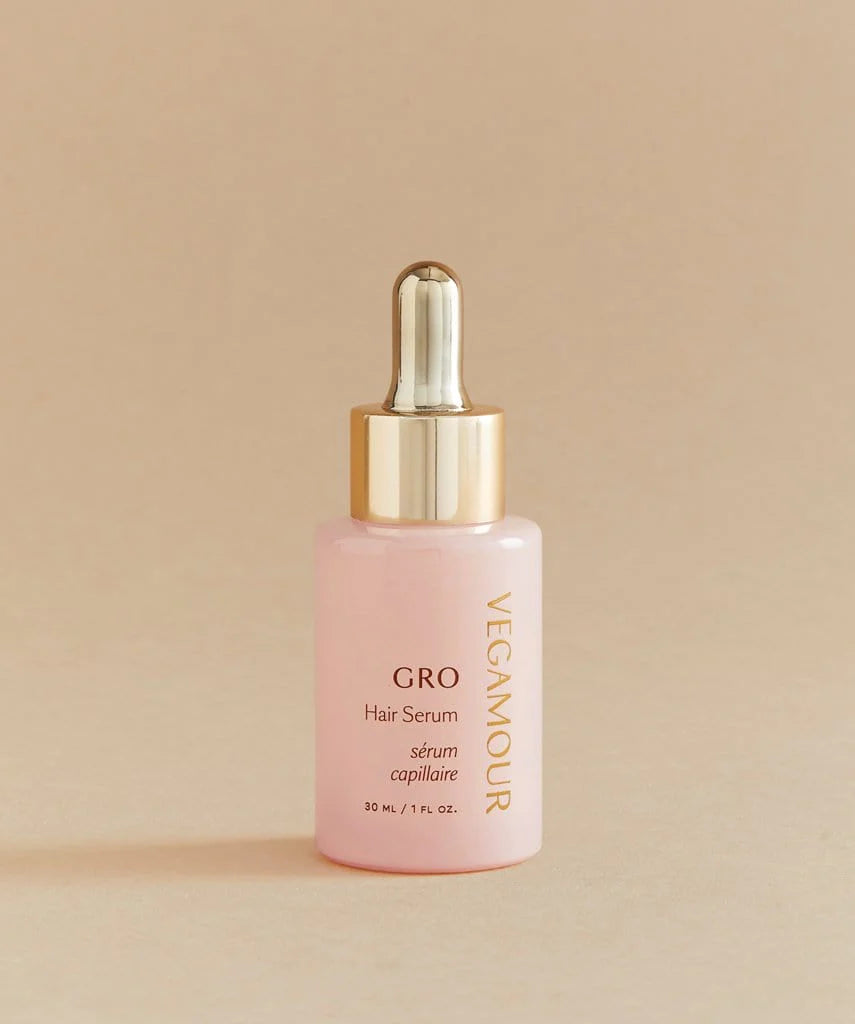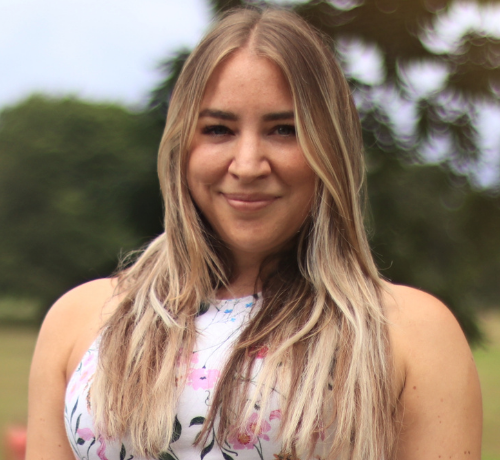Whether we're conscious of it, the hormones floating around your bloodstream play a huge part in how you feel and function. They impact your reproductive system, sleep cycles and even your heart rate. And when you experience a hormonal imbalance, your appetite, mood, body temperature and stress levels are impacted.
But did you know that hormonal changes can trigger hair loss and halt hair growth? Thankfully, you're more in control than you think, and there are things you can do to minimize hormonal hair loss. Read on to discover more about hormonal hair loss — plus, find out what products you really should try to support thicker looking hair.
#include-related-slider#
What Impact Do Hormones Have on Hair Loss?
"It's believed that hormones play a role in hair loss because they can affect the growth and health of hair follicles. For example, when thyroid hormone levels are too high or too low, this can lead to hair loss. Androgens (male hormones) can also cause hair loss by affecting the hair follicles," explained Dr. Cheryl Rosen, director of dermatology at BowTied Life.
Both men and women can experience noticeable hair loss as they age, but hormones can play a part for women in particular. Most women naturally shed 50-100 strands of hair a day; however, if the growth phase slows and hair thinning shows, you could be experiencing female pattern hair loss, aka androgenic alopecia. Androgenetic alopecia or pattern baldness can cause sudden hair loss and impact the hair growth cycle.
Hair grows in four cycles:
- The anagen phase is the new hair growth, which generally lasts between two and eight years and impacts up to 90% of your hair.
- The catagen phase is a transitional time when the hair follicles shrink. It usually lasts around two to three weeks.
- The telogen phase is the resting phase and lasts between two and four months and is the phase before the body sheds the hair and begins a new growth phase.
- The exogen phase is the shedding phase; it's normal to lose about 100 hairs per day. This phase is the shortest of all, lasting only a few days.
Shop: GRO More Kit for Hair
How Do Hormones Affect Thinning Hair?
Many people believe a receding hairline and hair thinning to be a male issue, but women suffer too. "A few different hormones can trigger hair loss in both men and women," explained Rosen. Additionally, not all hair loss is the same. There are different types and causes of hair loss, including the following:
- Anagen effluvium occurs when certain medication regimens impacts healthy hair follicles.
- Telogen effluvium is a type of temporary hair loss caused by an excessive number of hairs reaching the telogen phase at any one time.
- Androgenetic alopecia, or female pattern hair loss, is a common diagnosis for those who experience hair loss.
The most common cause of hair loss is hormonal hair loss. And not every hormone is the same; each can impact types of hair loss differently.
Estrogen and Progesterone
Menopausal women experience various symptoms and changes as their bodies enter a new phase. One common menopausal symptom is, unfortunately, hair loss. Estrogen and progesterone hormones help maintain a woman's reproductive system.
As the progesterone and estrogen levels drop, hair growth slows, and strands become thinner. Hair expert and cosmetologist Ghanima Abdullah explained, "Estrogen determines how long the hair will spend in the growth phase. During menopause, estrogen levels are reduced, so the hair doesn't typically grow as long. A person may also experience thinning due to low estrogen levels."
Alongside hair loss, menopausal symptoms include hot flashes, night sweats, interrupted sleep patterns, low mood, a reduced sex drive and problems with memory recall. If you're experiencing the adverse effects of menopause, check in with your health care provider to find out more.
Testosterone and DHT
"Testosterone increases during menopause, which means the metabolite of testosterone — DHT — is more freely available," said Abdullah. "Like cortisol, DHT also causes hair loss. It makes the hair follicles smaller in diameter so that they grow hair that's thinner and falls out easier. Eventually, miniaturized hair follicles die off, so at some point, the hair loss becomes permanent. This is androgenic alopecia. In women, this usually shows up as an all-over thinning instead of the receding hairline that's more common in men."
Cortisol
Chronic and prolonged stress can wreak havoc on the body. The "stress hormone" cortisol plays a role in the body's fight or flight response, and if cortisol levels remain high, your hairline could feel the effect. "Cortisol is a hormone emitted due to stress," said Abdullah. "The more prolonged the stress, the longer cortisol levels are elevated in the body and the more damage that can be done because of it."
Abdullah continued, "Cortisol affects the hair and can cause hair loss in a major way. Telogen effluvium is the type of hair loss specifically caused by high levels of cortisol. This is when the majority of the hair goes all at once into the telogen or resting phase. Mass hair shedding can occur with high levels of stress or trauma."
Stressful events such as a global pandemic, rapid weight loss, relationship troubles and significant life changes can weaken the immune system and impact hair.
A hair wellness routine is key to supporting healthy hair and feeling more relaxed. GRO Revitalizing Shampoo and Conditioner Kit will lift away impurities from the scalp with a light citrus scent that will brighten up your shower. The formulas are color safe, cruelty free and formulated without sulfates or silicones. Plus, Karmatin™, our proprietary vegan protein, bonds to hair leaving it feeling as smooth as glass.
Triggers for Hormonal Hair Loss
Any girl or woman at any age can experience hormonal hair loss, but common triggers include:
- Premenopause and menopause
- Postpartum
- Women over the age of 40
- Taking or stopping birth control
- Polycystic ovarian syndrome
- Thyroid disorders
- Prolonged stress
Regardless of your age or hormones, treating your hair with care and kindness will maintain hair growth and help prevent hair loss. You can also promote thicker, fuller looking hair with products that help the body stay calm.
A Serum for Thicker Looking Hair
Best-selling GRO Hair Serum is a natural, vegan blend of mung beans, red clover, curcumin, and caffeine that encourages thicker, fuller looking hair in as soon as 90 days when applied daily.
#include-related-slider#
How to Help Hormonal Hair Challenges
"Hair loss is almost always an indication of something going wrong or changing in the body," Abdullah advised. "So it's important as your first step to see your doctor and health care provider."
Additionally, rather than relying on harsh chemicals as a solution for thinning hair, choose natural, targeted hair wellness products. Also, as part of a holistic approach to hair health, eat a nutritious diet, stay hydrated, get enough sleep and reduce stress. All these strategies combined can help you increase the odds that you'll have plenty of good hair days ahead!
More From VEGAMOUR
- Why Choose GRO Hair Serum
- Dry Haircut vs. Wet Haircut - What You Need to Know
- 5 Things You Should Avoid If You Have Thinning Hair
- What Your Hair Can Tell You About Your Overall Health
Photo credit: Monstera/Pexels
Back




















